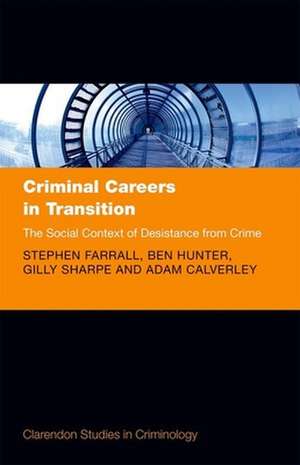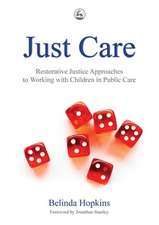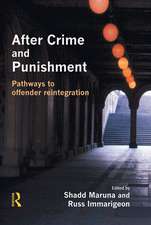Criminal Careers in Transition: The Social Context of Desistance from Crime: Clarendon Studies in Criminology
Autor Stephen Farrall, Ben Hunter, Gilly Sharpe, Adam Calverleyen Limba Engleză Hardback – 17 iul 2014
Din seria Clarendon Studies in Criminology
- 30%
 Preț: 524.88 lei
Preț: 524.88 lei - 27%
 Preț: 539.99 lei
Preț: 539.99 lei - 30%
 Preț: 597.87 lei
Preț: 597.87 lei - 30%
 Preț: 539.03 lei
Preț: 539.03 lei - 30%
 Preț: 540.50 lei
Preț: 540.50 lei - 30%
 Preț: 518.78 lei
Preț: 518.78 lei - 30%
 Preț: 598.04 lei
Preț: 598.04 lei - 30%
 Preț: 521.83 lei
Preț: 521.83 lei - 30%
 Preț: 538.41 lei
Preț: 538.41 lei - 30%
 Preț: 537.95 lei
Preț: 537.95 lei - 30%
 Preț: 539.99 lei
Preț: 539.99 lei - 28%
 Preț: 499.38 lei
Preț: 499.38 lei - 30%
 Preț: 539.66 lei
Preț: 539.66 lei - 27%
 Preț: 500.43 lei
Preț: 500.43 lei - 19%
 Preț: 673.85 lei
Preț: 673.85 lei - 30%
 Preț: 659.34 lei
Preț: 659.34 lei - 30%
 Preț: 838.79 lei
Preț: 838.79 lei - 27%
 Preț: 658.11 lei
Preț: 658.11 lei - 28%
 Preț: 496.73 lei
Preț: 496.73 lei - 25%
 Preț: 561.63 lei
Preț: 561.63 lei - 28%
 Preț: 424.05 lei
Preț: 424.05 lei - 31%
 Preț: 395.25 lei
Preț: 395.25 lei - 34%
 Preț: 579.34 lei
Preț: 579.34 lei - 14%
 Preț: 196.70 lei
Preț: 196.70 lei - 34%
 Preț: 600.54 lei
Preț: 600.54 lei - 30%
 Preț: 522.10 lei
Preț: 522.10 lei - 18%
 Preț: 339.31 lei
Preț: 339.31 lei - 19%
 Preț: 253.88 lei
Preț: 253.88 lei - 15%
 Preț: 395.89 lei
Preț: 395.89 lei - 34%
 Preț: 574.69 lei
Preț: 574.69 lei - 18%
 Preț: 301.83 lei
Preț: 301.83 lei - 34%
 Preț: 559.90 lei
Preț: 559.90 lei - 32%
 Preț: 466.28 lei
Preț: 466.28 lei - 34%
 Preț: 497.62 lei
Preț: 497.62 lei - 34%
 Preț: 522.00 lei
Preț: 522.00 lei - 30%
 Preț: 503.58 lei
Preț: 503.58 lei - 31%
 Preț: 413.86 lei
Preț: 413.86 lei - 34%
 Preț: 629.61 lei
Preț: 629.61 lei - 19%
 Preț: 566.42 lei
Preț: 566.42 lei - 9%
 Preț: 252.66 lei
Preț: 252.66 lei - 13%
 Preț: 167.56 lei
Preț: 167.56 lei - 31%
 Preț: 486.45 lei
Preț: 486.45 lei - 34%
 Preț: 633.17 lei
Preț: 633.17 lei - 30%
 Preț: 538.24 lei
Preț: 538.24 lei - 10%
 Preț: 270.95 lei
Preț: 270.95 lei - 31%
 Preț: 402.21 lei
Preț: 402.21 lei - 28%
 Preț: 473.39 lei
Preț: 473.39 lei
Preț: 462.53 lei
Preț vechi: 638.41 lei
-28% Nou
Puncte Express: 694
Preț estimativ în valută:
88.51€ • 91.85$ • 73.98£
88.51€ • 91.85$ • 73.98£
Carte tipărită la comandă
Livrare economică 04-10 martie
Preluare comenzi: 021 569.72.76
Specificații
ISBN-13: 9780199682157
ISBN-10: 0199682151
Pagini: 350
Dimensiuni: 157 x 222 x 27 mm
Greutate: 0.55 kg
Editura: OUP OXFORD
Colecția OUP Oxford
Seria Clarendon Studies in Criminology
Locul publicării:Oxford, United Kingdom
ISBN-10: 0199682151
Pagini: 350
Dimensiuni: 157 x 222 x 27 mm
Greutate: 0.55 kg
Editura: OUP OXFORD
Colecția OUP Oxford
Seria Clarendon Studies in Criminology
Locul publicării:Oxford, United Kingdom
Recenzii
Criminal Careers in Transition is an exceptional and an exceptionally rewarding book.
This wide-ranging and original book is a milestone in British desistance research, and essential reading.
I would strongly recommend it to students, probation staff, policy makers and researchers.
This wide-ranging and original book is a milestone in British desistance research, and essential reading.
I would strongly recommend it to students, probation staff, policy makers and researchers.
Notă biografică
Professor Stephen Farrall is Professor of Criminology in the School of Law at Sheffield University. Criminal Careers in Transition represents the third book in a series of his publications, which have charted the processes associated with desistance from crime for a cohort of ex-probationers, joining previous books: Rethinking What Works With Offenders (Willan, 2002) and Understanding Desistance From Crime (Open University Press, 2006). His more recent research focuses on the long-term effects of Thatcherite social and economic policies on crime, and is funded by the Economic and Social Research Council.Dr Gilly Sharpe is a Lecturer in Criminology in the School of Law at the University of Sheffield. Gilly's research interests converge on the impact of state intervention on poor, marginalised and vulnerable groups. Previous publications have examined criminalised young women (Offending Girls: Young Women and Youth Justice, Routledge, 2012), the support and supervision of women lawbreakers, including ex-prisoners and their children, and persistent young offenders. Gilly's current research focuses on transitions into adulthood amongst women criminalised as children. Prior to entering academia, Gilly was a practitioner in youth justice and the voluntary sector.Dr Ben Hunter is a Senior Lecturer in Criminology, in the School of Law at the University of Greenwich. His research interests include desistance from crime, white-collar crime and the contributions existential philosophy can make to understanding offenders' lives. His research combined these interests to assess the accounts of white-collar offenders who resettled following conviction and punishment.Dr Adam Calverley is a Lecturer in Criminology in the School of Social Sciences at the University of Hull. This book marks a continuation of his involvement in this project, having been researcher and co-author of the previous book in this series Understanding Desistance from Crime. His research interests include ethnicity, crime and criminal justice and life after punishment and publications include the Home Office Research Study, Black and Asian Offenders on Probation and the research monograph Cultures of Desistance (Routledge) - the first investigative study to examine processes of processes of desistance among minority ethnic offenders.










